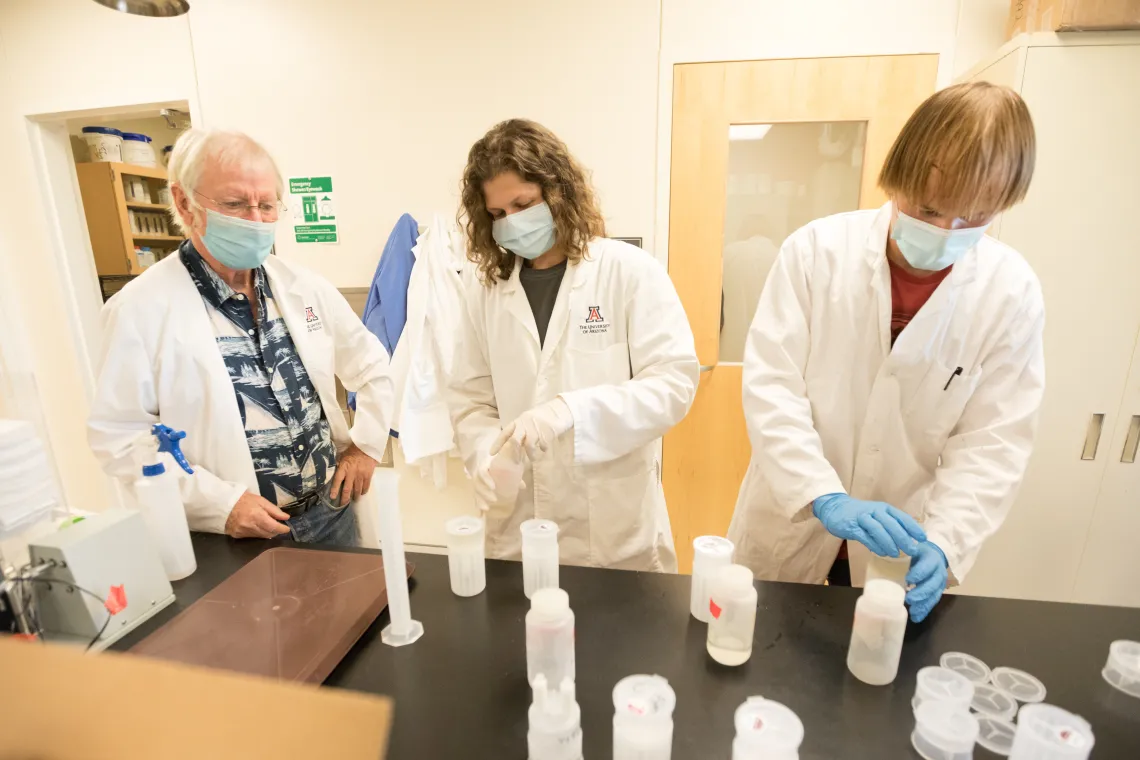WEST Center Researcher Spotlight: Erika Stark

The sophisticated equipment and technology at WEST Center coupled with world-class laboratory expertise makes WEST an exciting place to work and learn. Faculty and staff researchers continuously advance scientific knowledge related to water contamination and treatment, strategies to improve energy efficiency, and the impacts of different water qualities on the total environment.
One of the researchers significantly contributing to WEST Center accomplishments is Erika Stark. In this second profile piece, we feature Erika Stark – Research Technician III in the Department of Environmental Science – and her many projects and achievements at WEST Center.
* * * * * * * * * * * * *
Interview with featured researcher:
Erika, can you share about your educational background and what brought you to the University of Arizona and WEST Center?
I moved from Chicago to Arizona in the fall of 2013. I originally came to the UofA to be a pharmacist, but while taking a colloquium microbiology class, I found that I preferred microbiology. I switched majors and earned my bachelor’s degree in Microbiology from the University of Arizona in Fall 2017. During undergrad, I found out about the WEST Center while taking the Pollution Sciences class. At the time, I was interested in lab work and began volunteering at the WEST Center in the summer of 2016. I became a student researcher at WEST that fall. After I graduated in Fall 2017, I was hired as a tech and have been at the WEST Center ever since.
Wanting to further my education, I began a master’s program online in Public Health in 2018 while working full time at the WEST Center. I chose to complete a Master of Public Health (MPH) as I’m interested in how science and research informs public health; how data from research can be used to help communities. The recent pandemic has provided me an opportunity to work at this intersection of science and health action. Results of the SARS-CoV-2 research we conduct at WEST Center directly impacts public health decisions and interventions.
You’re busy with several projects at WEST, including the SARS-CoV-2/COVID-19 monitoring program and microplastics research. What are your main areas of interest/expertise? Can you tell us about your recent research?
When the pandemic started, I was mostly an entry level tech, but the pandemic and the associated research urged me to grow and adapt quickly. I am now a higher-level tech and have taken on more managerial tasks. Being a manager is a role I am especially interested in. I love the idea of growth and helping other researchers grow in their research and individual expertise. In research, I’m well-versed in many various techniques, but my recent activities center on molecular work for WEST and the SARS-CoV-2/COVID-19 wastewater surveillance project.
My current areas of focus at WEST Center are:
- Wastewater monitoring for SARS-CoV-2/COVID-19: I run analytical equipment to examine samples for SARS-CoV-2 and aid in tracking presence and prevalence of COVID-19 at the University of Arizona (campus) and in the local community. I’ve gained expertise in real-time quantitative polymerase chain reaction (RT-qPCR) and digital polymerase chain reaction (dPCR) techniques. I am devoting time to developing expertise with WEST’s new QIAcuity dPCR instruments.
- Evaluation of microplastics in soil: As part of a USDA project, I use an Agilent 8700 Laser Direct InfraRed Spectroscopy Chemical Imaging System (LDIR machine) to study microplastics in soil. Utilizing the cutting-edge instrument – currently located at Pima County RWRD – our team is working to determine the background/baseline levels of microplastics in soils, with the LDIR laser classifying the type of microplastic, particle size, and percent of type in each sample. The next step of the project, led by Dr. Pepper, will be to explore if/how microplastics (spiked and naturally occurring) impact soil microbial activity.
More information on WEST microplastics work can be found on the WEST Research page.
- Assessment of SARS-CoV-2 in bio-aerosols: A final project of interest is working with Dr. Ikner to evaluate if SARS-CoV-2 is aerosolizing. While currently on hold, this project will focus on analyzing samples taken from the nearby Tres Rios Water Reclamation Facility.
Have you had opportunities to present and/or publish your work?
For my public health internship course, I presented the SARS-CoV-2/COVID-19 work done at WEST Center.
Journal articles in review or published are:
- Ikner, L., Foster, A., Stark, E., Pepper, I. The AMP stress index: a new biological indicator of soil health. [submitted]. (2021). Soil Biology & Biochemistry.
- Foster, A.R., Stark, E.R., Ikner, L., Pepper, I. Reduction of chlorine demand in simulated pool systems by a magnetic field. [in review]. (2020). Water Supply.
- Schmitz, B.W., Innes, G.K., Prasek, S.M., Betancourt, W.Q., Stark, E.R., Foster, A.R., Abraham, A.G., Gerba, C.P., Pepper, I.L. Enumerating asymptomatic COVID-19 cases and estimating SARS-CoV-2 fecal shedding rates via wastewater-based epidemiology. (2021). Science of the Total Environment. https://doi.org/10.1016/j.scitotenv.2021.149794
- Betancourt, W.Q., Schmitz, B.W., Innes, G.K., Prasek, S.M., Pogreba Brown, K.M., Stark, E.R., Foster, A.R., Sprissler, R.S., Harris, D.T., Sherchan, S.P., Gerba, C.P., Pepper, I.L. COVID-19 containment on a college campus via wastewater-based epidemiology, targeted clinical testing and an intervention. (2021). Science of the Total Environment. https://doi.org/10.1016/j.scitotenv.2021.146408.
You mentioned that you completed both a bachelor’s and master’s degree at the University of Arizona. Any other educational aspirations?
Yes, that’s correct. My most-recently completed degree – finished in Spring 2021 – is a master’s in Public Health with a focus on health services administration. I am currently not pursuing another degree, but I may do so in the future. I am thinking about getting an MBA.
For more information about Erika Stark and her projects at WEST Center, please email her at erstark@email.arizona.edu.

Photo credit: UA and Chris Richards
Erika Stark working in a WEST Center lab, 2020

